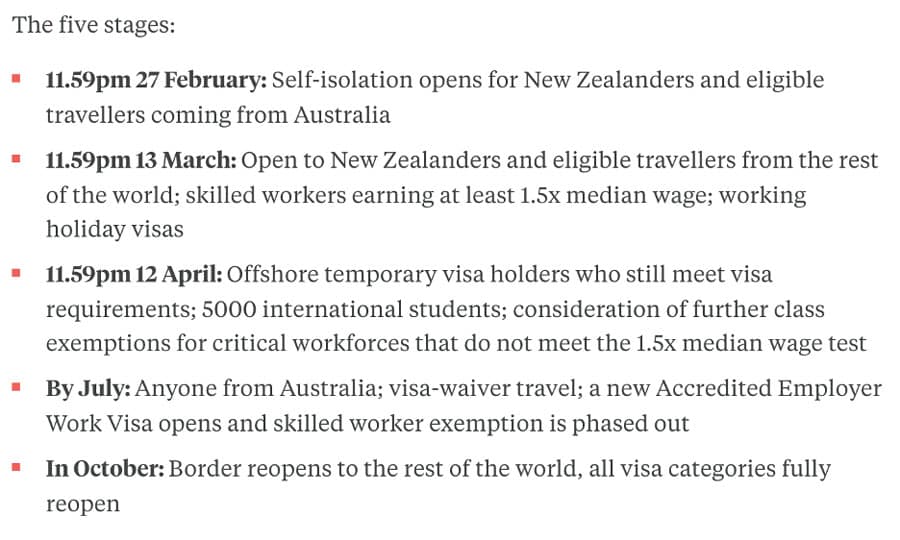New Zealand confirms border reopening; first international students to return April 2022
- An initial cohort of 5,000 international students will be allowed to return in April 2022
- Most international students will need to plan for 2023, however, as visa services for students will not fully ramp up again until October 2022
New Zealand will reopen its border in five stages throughout 2022, with fully vaccinated international students prioritised for the third stage beginning 12 April, when 5,000 international students will be allowed to return for the second semester of the academic year under a special border exemption category. More details about the selection process for those 5,000 students are forthcoming, but what is known is that the new cohort will be in addition to 1,000 students who were approved for entry in 2022 last fall.
Education New Zealand (ENZ) Chief Executive Chris Whelan adds there “is also an opportunity for students from Visa Waiver countries such as Japan and South Korea to enter New Zealand from July for short visits of up to three months.”
By October 2022, visa processing systems for the applications of all international students will be up and running. This effectively means that the vast majority of students who want to study in New Zealand will need to plan for 2023.
Charting the gradual reopening
The five stages of the border opening – and how they affect various classes of traveller – are summarised here in this outline from Radio New Zealand:

Too little too late?
New Zealand’s educators have known for some time of plans for a phased border reopening and will not be surprised by the timeframe. The return of some students this year will of course be welcome. But despite ENZ’s Mr McPherson calling the gradual opening of the border an “opportunity to rebuild and reshape” the sector, the fact remains that most international students will not return to New Zealand campuses until 2023. By then, Australia will have been accepting students for months, and other leading destinations will have welcomed international students for much longer than that.
Universities New Zealand Chief Executive Chris Whelan told Radio New Zealand last year that this represents a real problem for the country’s educators, who face a challenging new competitive landscape: “[New Zealand] will be the last of the traditional international education countries that will be still either closed to international students or requiring students to come through managed isolation.” (Editor’s note: It now appears that students will not need to enter managed isolation facilities but rather be required to self-isolate.)
Reacting to the news this week that the date for the 5,000 students’ ability to return is now set for 12 April, Mr Whelan told media website Stuff,
“At least some international university students will be able to make it onshore for the start of semester two, although only a small proportion of the number we know are clamouring to get here.”
He reiterated: “Australia, the US, UK and Canada are now all fully reopened to international students, but New Zealand won’t be until October…leaving us a year or more behind those competitor countries.”
Australia’s quick pivot towards welcoming international students back and offering them extended work hours and rights will also bear on New Zealand’s competitive position. According to Australian immigration minister Alex Hawke, Australia has quickly been regaining international students since reopening late last year, with 7,000 or so students arriving in the final week of January 2022. Mr Hawke told Times Higher Education that “his department had received more than 50,000 applications for student visas over that period and extra staff had been assigned to process them.”
For any international students with hopes of returning to New Zealand as part of the 2022 April border exception of 5,000 students, ENZ’s Mr McPherson emphasised that “students who have questions about this border class exception should contact their agent or preferred education provider in the first instance.”
For additional background please see:
















